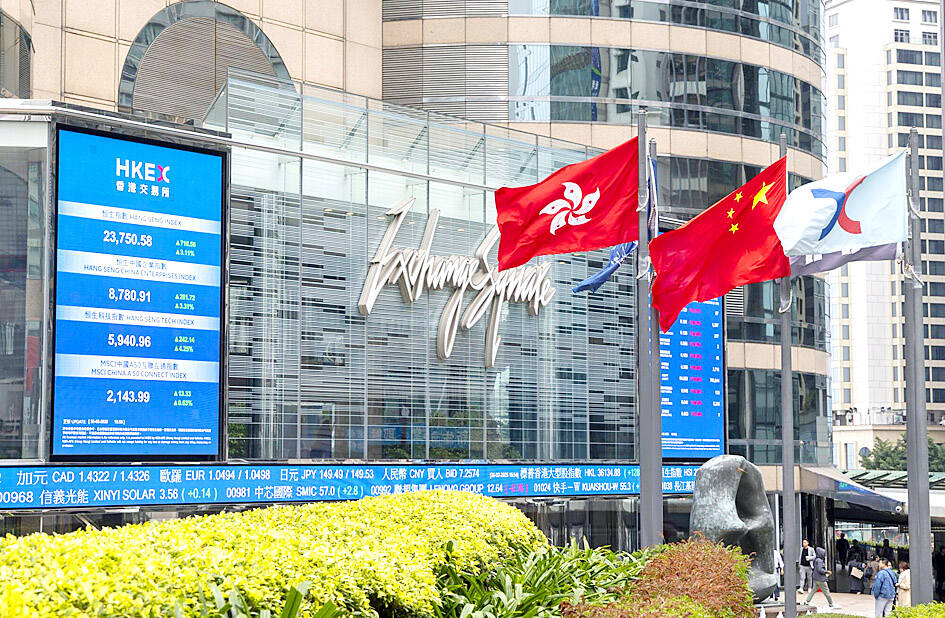Hong Kong’s stock exchange yesterday reported record profits and trading turnover, after a bumper initial public offering (IPO) that may signal a turnaround in the city’s fortunes as a listing hub.
Profit attributable to shareholders rose 10 percent to HK$13.1 billion (US$1.68 billion) last year while daily turnover for the cash equities market peaked at US$80 billion, Hong Kong Exchanges and Clearing (HKEX) said in a statement.
The Chinese finance hub saw a prolonged slump in IPOs since 2020, with mega-companies pausing their listing plans in light of Beijing’s regulatory crackdown.

Photo: Yik Yeung-man, Bloomberg
But the US$4 billion IPO of Chinese appliance maker Midea Group Co (美的集團) in September last year — the largest since 2021 — fueled hopes that Hong Kong could reclaim the crown as the world’s top listing destination.
Chief executive Bonnie Chan (陳翊庭), who took over in May last year and is the first woman to lead the stock exchange, said HKEX had made "significant strategic progress" last year.
"The improved macro backdrop supported renewed vibrancy and robustness of our markets, which was reflected in the largest IPO in Hong Kong since 2021 as well as an all-time record trading turnover," Chan said.
There were 71 IPOs, raising US$11.3 billion last year -- far below pre-pandemic peaks — but listing activity "noticeably stepped up momentum in the second half of the year as a result of China monetary and fiscal measures," Chan added.
Revenue and other income also grew nine percent to US$2.9 billion, a fresh record.
Chan said Hong Kong’s fundraising and secondary markets will be buoyed by "stimulative policies in mainland China and interest rate cuts in other major markets" this year.
Chinese battery giant Contemporary Amperex Technology Co Ltd (寧德時代), which provides more than a third of electric vehicle batteries sold worldwide, applied this month to list in Hong Kong, which analysts say can fetch more than US$5 billion.
Shanghai-based toymaker Bloks Group Ltd (布魯可集團) raised US$215 million in its Hong Kong debut last month, while the upcoming IPO of Chinese tea drink company Mixue Group (蜜雪集團) has seen strong demand, according to Bloomberg.
Hong Kong Financial Secretary Paul Chan (陳茂波) announced a program on Wednesday to fast-track the listing of specialist technology and biotech firms, particularly those already listed in China.
The stock exchange also implemented a long-awaited change in September last year to keep markets open during typhoons, matching the practice of major exchanges worldwide.
The city’s benchmark Hang Seng Index climbed to a three-year high this week, thanks in part to a recent surge in Chinese tech companies.

With an approval rating of just two percent, Peruvian President Dina Boluarte might be the world’s most unpopular leader, according to pollsters. Protests greeted her rise to power 29 months ago, and have marked her entire term — joined by assorted scandals, investigations, controversies and a surge in gang violence. The 63-year-old is the target of a dozen probes, including for her alleged failure to declare gifts of luxury jewels and watches, a scandal inevitably dubbed “Rolexgate.” She is also under the microscope for a two-week undeclared absence for nose surgery — which she insists was medical, not cosmetic — and is

CAUTIOUS RECOVERY: While the manufacturing sector returned to growth amid the US-China trade truce, firms remain wary as uncertainty clouds the outlook, the CIER said The local manufacturing sector returned to expansion last month, as the official purchasing managers’ index (PMI) rose 2.1 points to 51.0, driven by a temporary easing in US-China trade tensions, the Chung-Hua Institution for Economic Research (CIER, 中華經濟研究院) said yesterday. The PMI gauges the health of the manufacturing industry, with readings above 50 indicating expansion and those below 50 signaling contraction. “Firms are not as pessimistic as they were in April, but they remain far from optimistic,” CIER president Lien Hsien-ming (連賢明) said at a news conference. The full impact of US tariff decisions is unlikely to become clear until later this month

GROWING CONCERN: Some senior Trump administration officials opposed the UAE expansion over fears that another TSMC project could jeopardize its US investment Taiwan Semiconductor Manufacturing Co (TSMC, 台積電) is evaluating building an advanced production facility in the United Arab Emirates (UAE) and has discussed the possibility with officials in US President Donald Trump’s administration, people familiar with the matter said, in a potentially major bet on the Middle East that would only come to fruition with Washington’s approval. The company has had multiple meetings in the past few months with US Special Envoy to the Middle East Steve Witkoff and officials from MGX, an influential investment vehicle overseen by the UAE president’s brother, the people said. The conversations are a continuation of talks that

CHIP DUTIES: TSMC said it voiced its concerns to Washington about tariffs, telling the US commerce department that it wants ‘fair treatment’ to protect its competitiveness Taiwan Semiconductor Manufacturing Co (TSMC, 台積電) yesterday reiterated robust business prospects for this year as strong artificial intelligence (AI) chip demand from Nvidia Corp and other customers would absorb the impacts of US tariffs. “The impact of tariffs would be indirect, as the custom tax is the importers’ responsibility, not the exporters,” TSMC chairman and chief executive officer C.C. Wei (魏哲家) said at the chipmaker’s annual shareholders’ meeting in Hsinchu City. TSMC’s business could be affected if people become reluctant to buy electronics due to inflated prices, Wei said. In addition, the chipmaker has voiced its concern to the US Department of Commerce